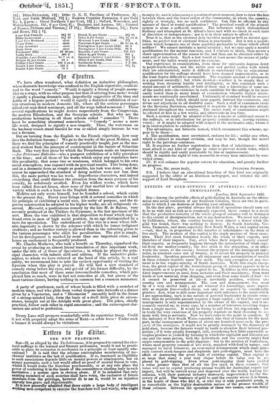tht
Ire have often wondered, what definition an inductive philosopher, whew dramatic knowledge was oonfined to the. English repertoire, could at- Mel to the word " comedy." Would it -signify a throng of people assem- ble! on a stage, with no other purpose but that of uttering bons mots? would it signify a pleasing.dramatic tale, imperfectly suggestive of the time and habits of a bygone period ? would it signify a distorted exhibition of cer- trin situations in modern domestic life, where all the serious personages talked cut-and-dried sentiment, and all the wags talked nonsense .? These several signification he might derive respectively from the Congrevian, the modern Elizabethan, and the Georgian schools. But why are the productions belonging to all these schools called " comedies "1 There must be something abnormal somewhere. " Comedy " seems a mere idle word, designed to signify a non-tragedy. Thus, the waterman on the hackney-coach stand fancied he was so called simply because he was not a fireman.
But on turning from the English to the French repertoire, how easy does the definition become I We go to the works of the great Moliere, and there we find the principles of comedy practically taught, just as the mu- sical student finds the precepts of counterpoint in the fugues of Sebastian Bach. The very first piece by which the Frenchman made an impression —Lea Precicuses Ridicules—was a pungent exhibition of -a folly prevalent at his time ; and all those of his works which enjoy any reputation have this peculiarity, that some vice or weakness, which belonged to his own social atmosphere, was exposed with its practical results. This being done, and in a dramatic form as simple as possible, his task was done ; and the nearer he approached the standard of doing neither more nor loss than this, the more perfect was his work. Superfluous characters, and indeed everything that "could distract the attention from the main purpose of his comedy, he sedulously avoided., Even. his wildest works, which have been called five-act fames, show none of that morbid love of incoherent variety which is such a bane to the English drama. Moliere not only wrote himself, but he founded a school, which exists to the present day. Every year brings with it several comedies in which his principle of exhibiting a social vice, his unity of purpose, and the ri- gorous construction he adopted in his higher works, are all religiously ob- served. Mercadet, a posthumous comedy by the late M. de Balzac, very recently produced at the Thattre du .Gyannase, is the last specimen of the sort. Here the vice exhibited is that disposition to fraud which may be found even in men of high social position, in an age distinguished by a taste for speculation. The embodiment of this vice is a man whose infi- nite ingenuity is shown by the schemes with which he tames indignant creditors ; and no further variety is allowed than in the colouring given to the various personages who elicit his peculiarities. The plot is simple, but its development is marked by more than one important crisis ; and hence an excitement is frequently produced. Mr. Charles Mathews, who took a benefit on Thursday, signalized the 'event by producing an almost literal translation of this important work, under the title of A Game of Speculation ; in which he played the prin- cipal character, with infinite skill and address. If the inductive philo- sopher, to whom we have referred at the head of this article, be a real entity, we recommend him to take the earliest opportunity of visiting the Lyceum when this play is played. He will find a new standard of comedy rising before his eyes, and get rid of his former difficulty, by the conclusion that most of these same irreconcileable comedies, which per- plexed him so much, were in fact not comedies at all, but pieces of the most various classes, having nothing in common but a common misnomer.


























 Previous page
Previous page